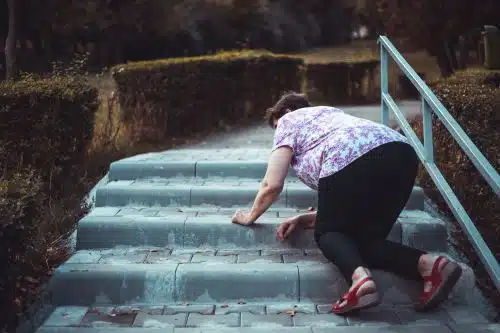Sometimes, the landlord may be liable if they failed to maintain a “safe environment” for tenants and guests. However, this depends on several factors, including how and where you were injured.
Is Your Slip and Fall Accident Due to Landlord Negligence?
Under North Carolina law, landlords are liable in some situations where the injury is due to:
- Defects or defective equipment.
- Negligent acts.
- Negligent omission to act.
However, this sometimes leads to questions about who provided the equipment or whether an act was negligent. Additionally, North Carolina uses contributory negligence statutes, which means that if the tenant is found to share any blame for the accident or injury, they will not be able to collect compensation.
First, it’s important to define two types of property that are found in rental situations:
- Leased premises. This area has been turned over to the tenant, and the landlord has little control over it. Typically, your apartment would count as leased premises.
- Common areas. A tenant might use these places in a rental property, but they are not under the tenants’ control. For example, parking lots, lobbies, stairwells, elevators, hallways, gyms, pools, and other recreational areas would be considered common property.
In most cases, landlords are responsible for the upkeep of common areas and are expected to keep them “reasonably safe.”
To this end, they should regularly inspect common areas and address potential hazards. For example, if a torn carpet on the stairs could cause someone to trip, the landlord should have it fixed.
Leased premises are considered the tenants’ responsibility, and before 1977, landlords had no liability for injuries in these areas. However, the Residential Rental Agreements Act created some protection for tenants in certain situations.
Specifically, the landlord must maintain a reasonably safe environment inside leased premises. Also, landlords cannot rent an “unsafe or uninhabitable residence.” They must also meet all obligations under building and housing codes.
Finally, your landlord must repair certain “imminently dangerous” conditions in a reasonable time frame. The Act includes a lengthy list of these dangerous conditions, but for the purposes of slip and fall accidents, the relevant ones are:
- Unsafe steps or flooring. This could include loose tiles or floorboards, uneven floors, frayed carpets, or holes or cracks in the floor.
- Unsafe ceiling or roof problems. Typically this relates to slip and fall cases because a leaky roof might lead to a slippery puddle on the floor.
- Standing water, sewage, flooding, and other plumbing issues. Again, these can increase the risk of slipping on the floor.
What Are the Tenants’ Responsibilities?
While landlords are responsible for maintaining a safe living environment, there are also some expectations for tenants.
First, you must report the hazardous condition to the landlord as soon as you notice it. You are legally required to do this in writing, but this is also important to prove you made the report later if necessary.
We’ve seen cases where the tenant reported a problem by calling the building manager or supervisor or perhaps knocking on their door in person. Unfortunately, in some cases, the manager claimed they “didn’t remember” this report or conversation.
This has even happened in cases where the tenant called multiple times about a problem.
Some property management companies use an online form for reporting maintenance issues. Using one of these forms is fine, but you should also email the manager to reiterate that you are reporting a problem with your floor tiles, etc. This way, you have a copy of the email in your Sent folder if the manager claims they “never saw that repair request.”
When Are Slip and Fall Injuries on Rental Property the Landlord’s Fault?
Sometimes people assume that if the landlord doesn’t resolve a dangerous situation, they are automatically negligent. In fact, under state law, failing to correct a hazardous situation isn’t negligence in itself, but it is evidence of negligence that can be used to argue liability.
Your lawyer can help you determine if you have enough evidence for a negligence claim.
There are several potential defenses the landlord – and their insurance carrier – may use when they receive your claim, including the “lack of knowledge” example from the previous section.
Another common defense is that the tenant repeatedly damaged the premises. For instance, the landlord might claim that you kept damaging the floor tiles by dragging heavy equipment across them, and the management company couldn’t keep up with the needed repairs.
Tenants are expected to avoid damaging the property either on purpose or through their own negligence, so your lawyer may work to prove that the damage was not your fault.
In other cases, a landlord may claim that the tenant agreed to fix certain issues in the apartment or home in exchange for a discount or break on rent. The Act allows for this type of arrangement, but it must be agreed upon in writing after the lease is signed and separate from any payment agreement.
The written agreement should clarify exactly what you were expected to fix.
Finally, tenants must make reasonable efforts to avoid injury in hazardous conditions. Your landlord might be responsible for fixing a leaky roof, but you can take precautions to avoid slipping into a puddle.
For example, placing a bucket under the leak would be reasonable to avoid a slippery floor. It would also be reasonable to warn your guests of the leak’s location so they don’t trip over the bucket.
Contact Tatum & Atkinson for Help With Your Rental Property Injury Today
If you’ve been injured in a slip-and-fall accident on a rental property, please contact Tatum & Atkinson for a free consultation about your case. Our experienced legal team has recovered over $100 million in compensation for our injured clients, and we’re always here to help.
If we take your case, there is no fee until we win or settle it, so please call 800-LAW-0804 today.

